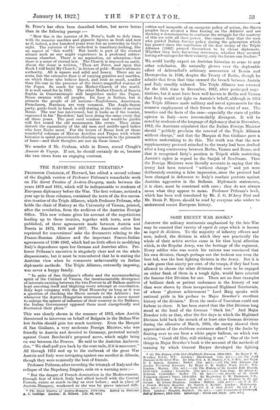THE HAPSBURG SECRET TREATIES. * PROFESSOR CoounciE, of Harvard, has edited
a second volume of the English version of Professor Pribram's remarkable work
on The Secret Treaties of Austria-Hungary, made between the years 1879 and 1914, which will be indispensable to students of European diplomacy before the War. The first volume, noticed a year ago in these columns, contained the texts of the five succes- sive treaties of the Triple Alliance, which Professor Pribram, who holds the chair of History at the University of Vienna, printed, after the revolution, from the archives of the Austrian Foreign Office. This new volume gives his account of the negotiations leading up to those treaties, together with texts, now first published, of three agreements made between. Austria and Russia in 1873, 1876 and 1877. The American editor has reprinted for convenience' sake the documents relating to the Franco-Russian Alliance and the important Franco-Italian agreements of 1e00-1902, which had no little effect in modifying Italy's dependence upon her German and Austrian allies. Pro- fessor Pribram's narrative is singularly clear and on the whole dispassionate, but it must be remembered that he is stating the Austrian view when he comments unfavourably on Italian diplomatic methods. The Triple Alliance, outwardly imposing, was never a happy family.
" In spite of San Giuliano's efforts and the accommodating spirit of the Cabinet of Vienna, the insurmountable divergence of interests existing between the two Powers in all Balkan matters kept asserting itself and blighting every attempt at conciliation. Italy kept company with the Dual Monarchy as long as it was a question of checking the Slavic onrush to the Adriatic ; but whenever the Austro-Hungarian statesmen made a move meant to enlarge the sphere of influence of their country in the Balkans, the Italian Government opposed thorn most energetically and frustrated their plans."
This was clearly shown in the summer of 1913, when Austria threatened to intervene on behalf of Bulgaria in the Balkan War lest Serbia should gain too much territory. Even the Marquis di San Giuliano, a very moderate Foreign Minister, who was friendly to Austria and devoted to Germany, protested warmly against Count Berchtold's proposed move, which might bring on war between the Powers. He said to the Austrian Ambassa- dor, " We shall pull you back by the coat-tails, if it. is necessary."
All through 1913 and up to the outbreak of the great War Austria and Italy were intriguing against one another in Albania, though they were nominally the best of friends.
Professor Pribram, after recording the triumph of Italy and the collapse of the Hapsburg Empire, ends on a warning note :—
" But the danger of French domination in the Mediterranean, through fear of which Italy had allied herself with the Central Powers, exists as much to-day as ever before ; and in place of Austria-Hungary, weakened as slid was by grave internal diffi- • The Secret Treaties of 'Austria-Hungary, 1879-1914. Edited by Professor A. C. Coolidge. London: EL Milford. [12.s. &I. net.] culties and incapable of an energetic policy of action, the Slavio peoples have secured a firm footing on the Adriatic and are showing a determination to continue the struggle for the mastery of this sea with all their power. One cannot deny that the men who guided Italian foreign policy during the generation which has passed since the conclusion of the first treaty of the Triple Alliance [1882] proved themselves to be clover diplomats. Whether they were far-seeing statesmen, whether they secured lasting advantages for their country, only the future can disclose."
We. could hardly expect an Austrian historian to come to any other conclusion. He naturally glosses over the deplorable effect of Aehrenthars arbitrary annexation of Bosnia and Herzegovina in 1808, despite the Treaty of Berlin, though he admits that from that time onward the breach between Austria and Italy steadily widened. The Triple Alliance was renewed for the fifth time in December, 1912, after prolonged nego- tiations, but it must have been well known in Berlin and Vienna that Italy would not fight on Austria's behalf, although in 1913 the Triple Alliance made military and naval agreements for the common employment of their forces in the event of war. The treaties and the facts of the case—especially the state of public opinion in Italy—were irreconcilably divergent. It will be noted by students of the language of diplomacy that in December,
1912, the Austrians stipulated that the Italian Foreign Minister should " publicly proclaim the renewal of the Triple Alliance without change," and that the Marquis di San Giuliano gave a written undertaking to do this. The truth was that the new
supplementary protocol attached to the treaty had been drafted after a long controversy between Berlin, Vienna and Rome, and that it recognized Italy's position in Tripoli while restricting Austria's rights in regard to the Sanjak of Novibazar. Thus the Foreign Ministers were literally accurate in saying that the treaty had been renewed " without change " and yet were deliberately creating a false impression, since the protocol had been changed in deference to Italy's resolute protests against Austrian aggression in the Balkans. Diplomatic statements, it is clear, must be construed with care ; they do not always
mean what they appear to mean. Professor Pribram's book, which has been well translated by Mr. J. G. D'Arcy Paul and
Mr. Denis P. Myers, should be read by everyone who wishes to understand recent European history.


































 Previous page
Previous page